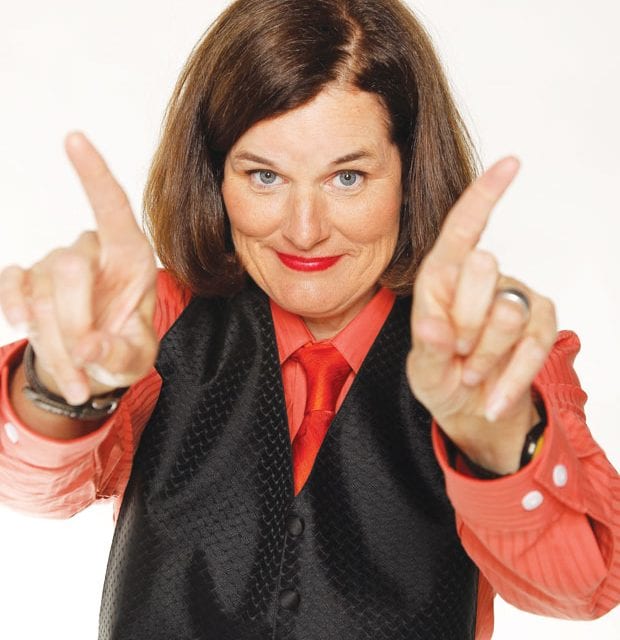
POUND FOOLISH | The out comic — a good friend and protege of the late genius Robin Williams — calls herself a standup, but her true calling was something much, much different.
Paula Poundstone makes merry, Mary — but not like most other comedians
ARNOLD WAYNE JONES | Executive Editor
Paula Poundstone’s comedy style is more identifiable for what it’s not than for what it is. It’s observational, but not trite (nary a “didya ever notice?”). It’s droll but rarely snarky. She can be political, but not viciously so. Indeed, even from her perspective, her comedy is ever-evolving.
“I do tailor [my act] to my audiences,” she says on the phone from her home in Santa Monica. “My favorite part is talking to the people — the time-honored, ‘Where are you from, what you do’ — because it’s organic. If you came to both shows [in Dallas] would you hear some crossover? Yes, but not the same.”
Part of the reason is Poundstone’s own work ethic — or perhaps lack thereof.
I have almost zero self-discipline when it comes to my quote-unquote ‘act,’” she says. “I carry around a folder to put ideas in, but it’s more a ritual than anything else now. When I think of something, I may jot it down and then I work it out verbally onstage over time but the finished product is not written anywhere. If it goes over well, I get the happy chemical release in my brain and it’s like giving a dog a treat and I remember it. Every so often [a joke] doesn’t go anywhere for the longest time and then it’ll hit. But not often.”

If her process sounds less like a process than a happenstance, well, that’s because standup comedy isn’t really her calling.
“The job I was best at and best suited to was table buser,” she says. “Ben Franklin would say he was a printer, and that’s how I feel. My backup job is standup comedy. I’m a really good table buser because I’m OCD, which gives me a gift. I worked at a restaurant [in my youth] and when I quit they had to hire two people to replace me. I was a dynamo. The idea of being ‘in the zone?’ I’ve achieved it more in table busing than comedy. Maybe I should go on my table busing tour … Honestly, it’s not out of the question.”
She’s kidding … probably. But that’s part of Poundstone’s appeal. From her live shows to TV appearances to near-weekly guest spots on National Public Radio’s Wait, Wait … Don’t Tell Me quiz show, she always seems a little befuddled by her own life and not afraid to share it. She famously lives with 15 cats and a couple of dogs. She has three children she has raised as a single parent, but she never makes motherhood sound like a blessing.
“I like to present a realistic picture of parenthood,” she cautions. “Having children is an ordeal. I don’t put pictures of my kids on Facebook — they say the whole Facebook syndrome [where people develop envy over their friends’ seemingly perfect lives] really affects us badly. We wonder how come we’re not like that? When I was a kid, I used to watch The Waltons and would sob — not because it was so sad, but because I thought, ‘My family is nothing fucking like this!’” No one feels that way after a Paula Poundstone set — you see yourself in her comedy.
This past year been a taxing one for her personally as well. One of her earliest champions and longtime friends was Robin Williams, who took his own life last summer.
“It was a horrible tragedy — a personal loss, but I feel it was a loss to everybody,” she says. “I just think of him as Tasmanian devil of comedy. I don’t know a lot about the details [of his death], but I think for me he was a mentor and a tower of strength. He was one of the most generous people I’ve ever known. Those of us who aren’t brilliant writers, one of the things Robin did was eliminate the segue — after him, you could just jump from topic to topic.”
Williams, like Poundstone, also knew the value of a live audience.
“I’ve loved the Three Stooges since I was a kid. But a couple years ago there was a film festival [of Stooges shorts] my kids and I went to, and we were sitting in a crowd that loved them. The waves of laughter were amazing. I saw stuff I’d never even seen before. I haven’t laughed out loud at them in years! It’s not that you can’t appreciate them [in private], but you’re missing the communal nature of comedy. It’s really, really important. I consider myself a proud member of the endorphin production industry.”
This article appeared in the Dallas Voice print edition January 16, 2015.

